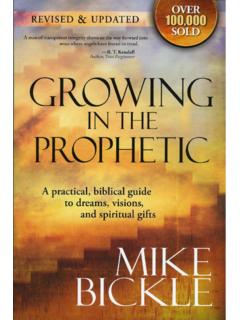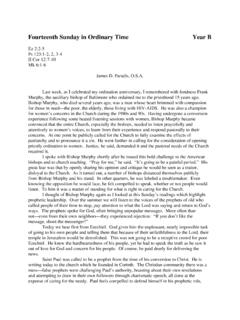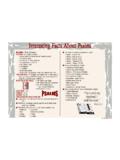Transcription of “Wisdom Language For the Frontiers” - Dong Hanh
1 48 COMIGO S 4/2013 The need of the present moment Today, I want to share something that has been on my mind for a while. Let me start with June 25 which is barely a month ago. That morning I was visited by two Religious. Towards the end of the visit they asked me What do you think are the most urgent needs of the Church today? What should be our priorities? That s a surprising question when you feel that the conversation is coming to an end, because it starts all over again. This is a question that we ponder over very much in our hearts, in our minds. That same afternoon I had an appoint ment with Pope Francis, and we both arrived at the same question How can the Society of Jesus best help and serve the Church? The answer to these questions had in a way al ready been given three days earlier when the Pope had met Fr. Dumortier, the Rector of the Gregorian University. The Pope had con veyed to the Rector that he expected Jesuits to take the Intellectual Apostolate very seri ously.
2 He af irmed his desire that priests should go out to the periphery because it is wisdom Language For the Frontiers Fr. Nicola s address to the World CLC Assembly Lebanon, 4th August, 2013 49 from there that one gets a better view of the Church and how it is functioning. He continued by saying that the experience of the periphery is very important but it needs to be complemented by re lection at the centre. Without re lection at the centre, the experience of the periph ery does not bear the fruits of the gospel that the Lord wants. So this was the Pope s re lection. On the other hand, we had a meeting of Jesuit Universities in 2010 in Mexico. A slogan that caught the imagination of those pre sent was The biggest danger today is the Globalization of Super iciality . The message that came through in Mexico is that we Jesuits have to aim and direct our efforts at Depth depth in our re lections, in our un derstanding of reality, in our spiritu ality, etc.
3 This same message had been given to me often by the previ ous Pope, Benedict XVI. Every time I met him, he would hold my hands and say, The Church expects depth from the Society of Jesus depth in study and depth in spirituality. So I think there is a concurrence that this is the need of the present moment. In today s world, we are looded with information. Just Google a particular topic and you will ind thousands of pages telling you something on that topic. But nobody tells you what the truth is, nobody. And Google can t. There is no sense of the truth, no criteria for inding out how true the facts are. We risk making judgements with mere information and therefore make wrong judgements. During my light coming here, I was reading on my Kindle a book Dif icult Conversations . The book is about the fact that all of us have dif icult conversations whether it be in the family, in religious life, in management etc. People have dif i cult conversations because they disagree on something important.
4 The book goes on to say that there are actually three conversations which keep criss crossing. The irst is the conversation of facts What is really happening? The second is the conversation of feelings Do I feel hurt, neglected, taken for grant ed? Finally, there is the conversa tion of identity which touches on my value and self worth Who does he think I am? The book helps us to be aware of these three levels in order to handle the conversations better. All of this points to the fact that we need depth. We need to know with a certain amount of re lection and a certain amount of wisdom . Is this different from what we said at Fatima? Those of you who were present at Fatima will recall that we spoke about the prophetic mission, the dimensions of prophecy and how to 50 COMIGO S 4/2013 be prophetic . But now, is this some thing different? Are we faced with a different need? In order to put things in perspective, let me share a Biblical re lection.
5 I have checked this with the professors at the Bibli cal Institute so as not to be very much off the track. That is the ad vantage of being in Rome you can consult the experts! It struck me that in the Bible we have three very different languages. These are clearly different lan guages that correspond to the expe rience of a people in their relation ship with the Lord. The irst Language is naturally the Language of building a people. Israel did not have any identity at irst. The people were slaves and migrants who were being exploited and had just come out of Egypt. The process of building an identity is recorded in the irst books of the Bible. And here we have the lan guage of history. It speaks about the great things God did for them. They mix history and mythology and glo rify some facts and events so that the people can feel proud of belong ing to this community. This is his torical Language which appears in the historical books of the Bible.
6 It gives a sense of belonging and a sense of pride in being a people who can truly say God is with us . Once the identity is established, the prophets appear and now we have prophetic Language . The peo ple s faith is linked very much with their national identity, and this faith gets contaminated due to manipula tion, political narrowness and exclu sion. So the prophets appear to challenge the faith and purify the faith. They challenge the pilgrimag es and festivals because these ne glect the people. The core of reli gion is compassion, and when Israel forgets about compassion, the prophets appear. They remind peo ple that God is not interested in of ferings and sacri ices if the most important part of the covenant is neglected. So prophecy always aris es within the community of faith and tries to purify that faith. Then the Exile happened and the people felt betrayed and abandoned. Then most of Israel and we should not soften the blow yes, most of Israel lost their faith.
7 Only a few, the remnant, kept their faith. Their faith was based on God acting in their history and when they lost the tem ple and were exiled to other coun tries, they wondered where God was. And many lost their faith. And then, the prophets disappear. When there is no faith, prophetic Language does not make sense. Their chal lenges fall lat and there are no hearts to be moved. At this point, a new Language emerges the lan guage of wisdom . This is the wis dom of inding God in everything .. now you see the connection to the topic. It is the Language of God 51 working in the family, in the chil dren, in culture, in everything. This leads the people into a new relation ship with God, a relationship of depth and wisdom . This is a lan guage that makes sense to believers and unbelievers alike. Maybe it is the emerging Language for the fron tiers in today s world. Where are we in the world? Europe and the West the so called Christian West is going through a tremendous crisis of faith.
8 Prophet ic Language is no longer relevant because there is no faith to purify. A new Language is needed, and the Bible gives us the key to this. It is interesting that for a long time I had thought (because that was the rhet oric for several years) that wisdom belongs to Asia. We would say that Asian religiosity is based on wisdom while prophetic religion belongs to the Christian West. Now we hear that we need wisdom in education, in social work, in pastoral work and so on. So the quest for wisdom is not any more a monopoly of Asian communities. It is universal. It is interesting to see how Pope Benedict would speak the Language of wisdom each time he went to the frontiers. And people were amazed. He went to France and spoke of sec ularity in a very positive way. He went to London and spoke in a lan guage that everybody could follow .. and so too, in Germany. Then Pope Francis came along with a fur ther emphasis on the Language of the common man.
9 It is the Language of being poor, of being compassion ate, of telling everybody good evening and have a good meal and have a good rest etc. This has a lesson for us since it demonstrates an ability to change, an ability to adapt. In this Assembly, you are dis cussing the processes from the roots to the frontiers . We may dis cover that we have the same pro cesses as the people of Israel. We need the time of building up history, a period of puri ication of that iden tity and now, in the world we are in today, we need much more the lan guage of wisdom . It is interesting to hear Pope Benedict say that an agnostic who searches is better than a Christian who does not search. A person who thinks he has all the answers is dan gerous, because nobody can have all the answers. I remember seeing a poster at the Asian Pastoral Insti tute at Manila. It was a poster of an orang utan lying on the loor and looking up. The caption read Just when I knew all the answers, they changed the questions.
10 It conveyed a sense of giving up, which is the attitude of many priests. You come out of the Seminary knowing all the answers and then realize that the questions have changed. And you 52 COMIGO S 4/2013 feel like that orang utan .. What has happened? We need to take this seriously because this is not only a western problem. Now, all our cul tures are becoming more pluralistic. This kind of secular thinking and the desire for wisdom is becoming a general trait in all cultures. In some places this is advancing slowly, but it is coming. We must look at the life of the youth because they are the key to understand what is hap pening. Young people are on the internet all the time. They are like native residents in this new world (unlike us old people who are mere passengers!). So we need three languages. For new Christians and new CLC mem bers, we need the Language of histo ry to build up the identity. We need the Language of prophesy within the community of faith, to challenge those who believe.








